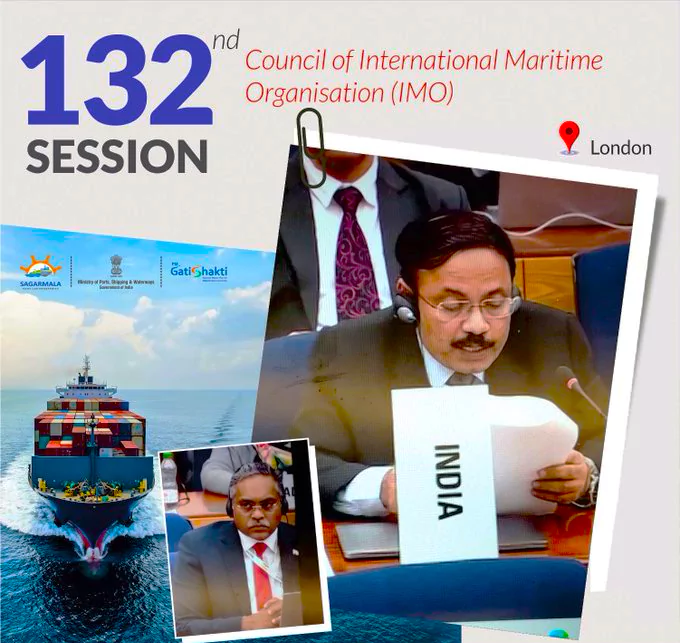The 132nd session of the Council of the International Maritime Organization (IMO) was recently held in London.
- It addressed various critical issues and proposals for the future of global maritime operations.
Crucial Insights on the Focus Areas for India at the IMO Session
India is an elected member of the IMO Council in the category of countries with the largest interest in international seaborne trade. India remains deeply committed to addressing the issue of seafarer abandonment and ensuring the safety and welfare of the maritime workforce.

- Emphasis on the Urgent Issue of Seafarer Abandonment: India emphasised the ongoing crisis of seafarer abandonment, with 44 active cases involving 292 Indian seafarers.
- Achievement: India’s strong stance on the need for effective measures and oversight to resolve such issues was well received.
- In recognition of its continued commitment to addressing seafarers’ issues, India secured its position as one of the eight governments representing IMO in the Joint Tripartite Working Group.
- Other Proposed Members: Philippines, Thailand, Liberia, Panama, Greece, the US, and France
- Role of the Joint Tripartite Working Group: This group is dedicated to identifying and tackling seafarers’ issues and the human element in maritime operations.
- Maritime Cooperation and Innovation: India’s participation in the IMO Council session underscores dedication to international maritime cooperation and innovation.
- The establishment of the South Asian Centre of Excellence for Sustainable Maritime Transport is a testament to India’s leadership in promoting environmentally sustainable and technologically advanced maritime practices.
- India looks forward to collaborating with global partners to drive positive change in the maritime sector.
- Commitment to Maritime Safety and Security: The Indian delegation also addressed concerns over disruptions in the Red Sea, Gulf of Aden, and adjoining areas, which have been impacting shipping and trade logistics.
- Successful Missions: The Indian Navy’s successful missions were highlighted. These included rescuing a Marshall Island-flagged crude oil carrier, MV Marlyn Luanda, and the interception of the vessel MV Ruen off the coast of Somalia, ensuring the safety of crew members and handling piracy threats effectively.
- South Asian Centre of Excellence for Sustainable Maritime Transport (SACE-SMarT): India reiterated its proposal for the SACE-SMarT.
- Aim: To transform the maritime sector in India and South Asia into a technologically advanced, environmentally sustainable, and digitally proficient industry.
- Role: It will focus on reducing greenhouse gas emissions, fostering technical cooperation, capacity-building, and digital transition.
- Significance: India’s leadership in evolving the SACE-SMarT in collaboration with the IMO’s global Maritime Technology Cooperation Centres (MTCCs) was highlighted as a significant step towards sustainable maritime development.
Enroll now for UPSC Online Course
About the International Maritime Organisation (IMO)
It is the United Nations specialised agency responsible for the safety and security of shipping and preventing marine and atmospheric pollution by ships.
- History: In 1948, an international conference in Geneva adopted a convention formally establishing IMO (the original name was the Inter-Governmental Maritime Consultative Organization, or IMCO, but the name was changed in 1982 to IMO).
- The IMO Convention entered into force in 1958 and the new Organization met for the first time the following year.
- Members: IMO currently has 176 Member States and three Associate Members (Faroes, Hong Kong, China, and Macao, China.
- India has been one of the earliest members of the IMO, having ratified its Convention and joined it as a member state in 1959.
- Composition: Consists of an Assembly, a Council, five main Committees, and a number of Sub-Committees that support the work of the main technical committees.
- Role of IMO: To promote safe, secure, environmentally sound, efficient, and sustainable shipping through cooperation.
- Key Conventions:
-
- International Convention for the Safety of Life at Sea (SOLAS), 1974, as amended.
- International Convention for the Prevention of Pollution from Ships, 1973, as modified by the Protocol of 1978 and the Protocol of 1997 (MARPOL).
- International Convention on Standards of Training, Certification and Watchkeeping for Seafarers (STCW) as amended, including the 1995 and 2010 Manila Amendments.
|
![]() 13 Jul 2024
13 Jul 2024
